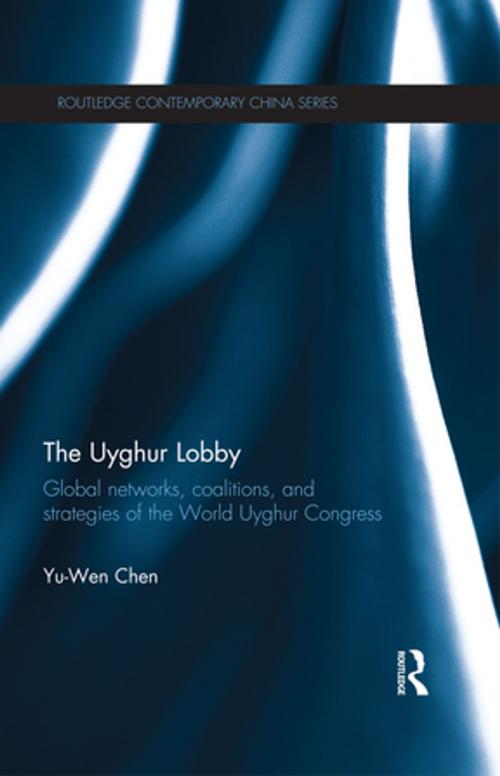The Uyghur Lobby
Global Networks, Coalitions and Strategies of the World Uyghur Congress
Nonfiction, Social & Cultural Studies, Social Science, Cultural Studies, Ethnic Studies, Political Science| Author: | Yu-Wen Chen | ISBN: | 9781134633807 |
| Publisher: | Taylor and Francis | Publication: | December 17, 2013 |
| Imprint: | Routledge | Language: | English |
| Author: | Yu-Wen Chen |
| ISBN: | 9781134633807 |
| Publisher: | Taylor and Francis |
| Publication: | December 17, 2013 |
| Imprint: | Routledge |
| Language: | English |
An upsurge in violence between Uyghur and Han in China’s far western region of Xinjiang has gained increased media and academic attention in recent years as was evidenced in the July 2009 riots. Numbering over eight million, the Uyghur are China’s fifth-largest minority nationality, and their mounting aspiration for obtaining more autonomy has contributed to the recent ethnic conflicts in the region. This book looks at those who are seeking to preserve the Uyghur identity, and support the secession of Xinjiang from China in order to create their own independent state by exploring the global operations and sister groups of the Uyghur diaspora umbrella organization, the World Uyghur Congress (WUC). It examines the networks of the WUC, the coalitions it has formed, the strategies the organization pursues to raise public awareness about Uyghur issues around the globe, and looks at the actors that have emerged as key players in the contemporary WUC network. Further, this book shows that the Uyghur lobby is not a unified movement, but that the local groups that it consists of are highly constrained by the broader domestic politics of their host countries, a fact which has a significant impact on the lobby’s ability to realize its strategic and political ambitions. In turn, Yu-Wen Chen gauges the impact of the WUC on public opinion and policymakers in the world’s democracies, and shows how since Uyghur organizations have been given legitimacy by liberal democracies and international governmental organizations, they can no longer be considered merely splintered members of a far-flung diaspora locked in a one-sided struggle with Beijing. Indeed, Uyghur activists can and do use their hard-won legitimacy as legal migrants and asylum seekers to influence politics in their host countries.
This unique and timely study reveals how an issue concerning a Chinese minority has been catapulted onto the wider global political stage, and as such, it will be of great interest to students and scholars working on Chinese politics, the Uyghur issue, and minority and ethnic politics, social movements, human rights, and international politics more broadly.
An upsurge in violence between Uyghur and Han in China’s far western region of Xinjiang has gained increased media and academic attention in recent years as was evidenced in the July 2009 riots. Numbering over eight million, the Uyghur are China’s fifth-largest minority nationality, and their mounting aspiration for obtaining more autonomy has contributed to the recent ethnic conflicts in the region. This book looks at those who are seeking to preserve the Uyghur identity, and support the secession of Xinjiang from China in order to create their own independent state by exploring the global operations and sister groups of the Uyghur diaspora umbrella organization, the World Uyghur Congress (WUC). It examines the networks of the WUC, the coalitions it has formed, the strategies the organization pursues to raise public awareness about Uyghur issues around the globe, and looks at the actors that have emerged as key players in the contemporary WUC network. Further, this book shows that the Uyghur lobby is not a unified movement, but that the local groups that it consists of are highly constrained by the broader domestic politics of their host countries, a fact which has a significant impact on the lobby’s ability to realize its strategic and political ambitions. In turn, Yu-Wen Chen gauges the impact of the WUC on public opinion and policymakers in the world’s democracies, and shows how since Uyghur organizations have been given legitimacy by liberal democracies and international governmental organizations, they can no longer be considered merely splintered members of a far-flung diaspora locked in a one-sided struggle with Beijing. Indeed, Uyghur activists can and do use their hard-won legitimacy as legal migrants and asylum seekers to influence politics in their host countries.
This unique and timely study reveals how an issue concerning a Chinese minority has been catapulted onto the wider global political stage, and as such, it will be of great interest to students and scholars working on Chinese politics, the Uyghur issue, and minority and ethnic politics, social movements, human rights, and international politics more broadly.















